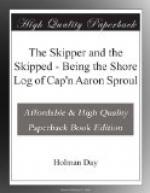“I’ve beat nor’west from the railroad, fetched a covered bridge on the port quarter, shipmates,” he roared, jovially, “and here I be, bearin’s lost and dead-reck’nin’ skow-wowed.”
“Seems to be your breed,” sneered Ward to the Cap’n. “What’s that he’s sayin’, put in human language?”
“I’m chartered for port—port”—he also referred to a folded paper—“to port Furliny Pike, som’eres in this latitude. Give me p’ints o’ compass, will ye?”
Ward leaped to his feet and strode toward the fence, his long legs working like calipers.
“What do ye want of Pharline Pike?” he demanded, angrily.
“None of your business,” replied the cheerful sailor. “If this is the way landlubbers take an honest man’s hail, ye’re all jest as bad as I’ve heard ye was.”
“I’m a mind to cuff your ears,” yapped the Colonel.
The other glanced up the angular height of his antagonist.
“Try it,” he said, squaring his sturdy little figure. “Try it, and I’ll climb your main riggin’ and dance a jig on that dog-vane of a head of yourn.”
This alacrity for combat clearly backed down Ward. In his rampageous life his tongue had usually served him better than his fists.
“Avast, shipmate!” called the Cap’n, in his best sea tones. The sailor beamed delighted recognition of marine masonry. “The fact of the matter is, my friend here has some claim—the truth is, he’s—”
“You go ’long two miles, swing at the drab school-house, and then take the second house—white one—on the left-hand side of the road,” bawled Ward, “and you go mighty quick!”
The sailor ducked acknowledgment and rolled away.
“If you’d unpinned that mouth of yourn fur enough to tell that tramp that I’m engaged to Pharline Pike,” growled Ward, returning to the tree, “I’d ‘a’ broke in your head—and you might as well know it first as last.”
“Ain’t you engaged to her?”
“You know I be.”
“Well, I’ve allus told the truth all my life—and I reckon I shall continner to tell it. If you’re ashamed to have it knowed that you’re engaged to Pharlina Pike, then it’s time she heard so. I’d jest as soon tell her as not.”
“I started to say to you,” raged Ward, “that you’d stuck your finger into my pie altogether too deep. I ain’t killed as many sailors as you’re braggin’ on, but there ain’t no man ever licked Gid Ward, and—”
“Near’s I can tell from what I hear about you,” retorted the Cap’n, “built on racin’ lines as you be, you’ve never let a man git near enough to lick ye.”
Again the Colonel noted that red vengefulness in the skipper’s eyes, and recoiled suspiciously.
“Oh, my rheumaticks!” the seaman hastened to moan.
Ward had his back to the fence.
“I cal’late as how there’s another party that wants his bearin’s,” suggested Sproul.
A rather decayed-looking gentleman, wearing a frock-coat shiny at the elbows, and a fuzzy plug-hat, was tapping his cane against one of the pickets to attract attention.




